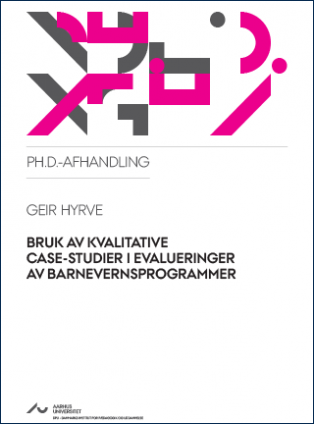Bruk av kvalitative case-studier i evalueringer av barnevernsprogrammer
Synopsis
This thesis, titled "Use of qualitative case studies in evaluations of child welfare programs", was submitted autumn 2018 for the PhD degree at the Danish Institute for Education and Education (DPU), Faculty of Arts, Aarhus University. The purpose of this dissertation is to conduct an analysis of previous evaluations, thereby developing insight and understanding of how minor case studies can contribute to the understanding and development of knowledge within the field of child welfare. After completing many evaluations in public sector, the purpose of this dissertation has been to analyze how these evaluations of programs have contributed to the development and renewal of a field of expertise. In order not to narrow the scope of the study, I have chosen to specifically explore programs in the field of childcare that I also previously have evaluated.
This is the overall objective of the dissertation: What use do qualitative case studies have in the evaluation of child welfare programs?
In order to refine and clarify the topic, I have come up with three research questions.
• What knowledge can evaluations gathered through case studies generate about child welfare programs? • What empirical, political and social practices appear in case studies?
• Can evaluations based on case studies help to develop services in the field of child welfare?
The starting point of this dissertation is to find out more about the use of case studies in evaluations and the knowledge they emerge. An evaluation consists of empirical, political and social practices where the evaluator gathers and interprets data that are used in the interpretation and evaluations of a program. A relevant question is how case studies can be used to develop service provision in the child welfare field.
To answer the research questions I analyzed two evaluations that used case design. In order to create a personal distance to the data material, I constructed an analytical model and used intervention theory in the retrospective analysis. First, the evaluations were analyzed individually, and then a cross-case analysis was conducted to understand the relationship between intervention, evaluations and user effects. The two programs evaluated were different, one having a "top-down" approach to social improvement within the child welfare field, while the other program had a bottom-up strategy for change and development. Common to the evaluations was that a program theory was used to systematically focus on some key points and provide a detailed description of what has been achieved, how it has happened, and why. It was important to gain knowledge of the process that led to user effects in the programs. The two examples of case studies showed that the type of interventions had impact on the evaluation. How change occurred affected the role of the evaluator, but also the actual evaluation process and development of knowledge. In case one, the evaluation consisted of a study of a decision-making method that “was traveling”, and was attempted translated into local practice, and the question was to what extent do ideas “work” in the local child welfare services? A form of best practice was implemented in a Norwegian context to improve practice, and the evaluation assignment was to determine if the change led to the prescribed results. Fidelity and application were at the heart of this evaluation, in addition to the view that knowledge is something that can be identified. In the second evaluation, there was a completely different and practical approach to a program in a residential childcare institution. The evaluation focused on practice with the purpose of making interpretative assessments of the value of human actions that took place in the institution, i.e. in a particular social, historical, and cultural context. In other words, knowledge was linked to social, historical, and cultural situations that occur when the users, the staff, the evaluators and the external stakeholders interact, what can be referred to as situational and co-learning.
A case design provides the opportunity to understand why and how programs work, at both the micro and the meso level, but it is difficult to transfer this knowledge to the community level. Evaluations based on this case design offers opportunities to provide feedback that can be used both to understand what a program succeed with, and what not being achieved, something that can contribute on how to deal with interventions in the field of child welfare in a new and more constructive manner. Retrospective evaluations represent a source of understanding and learning from programs that have been implemented, and can also be used prospectively.

